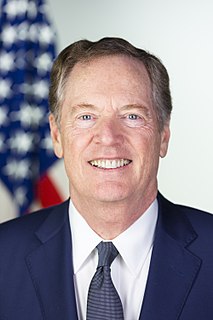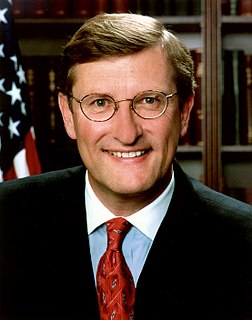A Quote by Stephen Moore
In almost every case, whenever a tariff or quota is imposed on imports, that tax is strongly supported by the domestic industry getting the protective shield from lower-priced foreign competition. The sugar industry supports sugar tariffs; textile mills lobby for tariffs on foreign clothing.
Related Quotes
Tariffs are in the end taxes. And somebody has to pay that tax. I think one thing people are forgetting is that trade disputes are two-sided. When the United States imposes tariffs on a partner like Canada, there is always a possibility that Canada will say that's not fair and retaliate. And at that point, you have to ask the question, - which U.S. industry will suffer because the Canadians retaliated against it?
What [Donald] has put up for question is this idea of tariffs. Initially, he said if China won't stop taking advantage of us and manipulating their currency, then I will put tariffs in place. That spooked everybody because if you charge China a fee and an extra tariff for anything they bring into the United States, what's going to happen is that companies carrying those goods are going to raise prices. It's going to be expensive for people. People got scared of that, but then he walked that [idea] back. I don't think anybody is expecting heavy tariffs on anything.
Take a cup of coffee, keep adding sugar until you reach the point that you like it the most, and then when you add more sugar, you actually like it less. Well, the food industry knows that, and they spend huge amounts of effort finding the perfect spot, not just for sugar, but for fat and salt, as well.
One thinks that one is winning when we slap tariffs or introduce barriers to imports from another country, and we think we win. But you lose when you export because the other countries are going to raise tariffs as well. They're going to introduce barriers as well. So you win with one hand and you lose with the other.
Well, the sugar guys have been dealing with NAFTA ever since it passed. Now we've got Mexico dumping sugar that's subsidized by the Mexican government into our market in violation of the World Trade Organization, because NAFTA gave them open access to our sugar market. They claim they're not subsidized, but the government owns half the industry in Mexico.




































